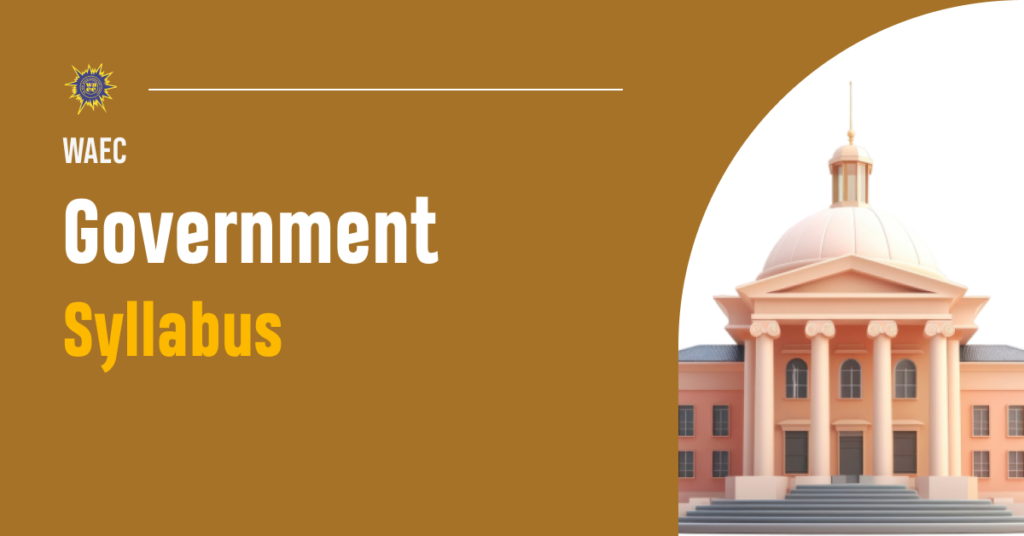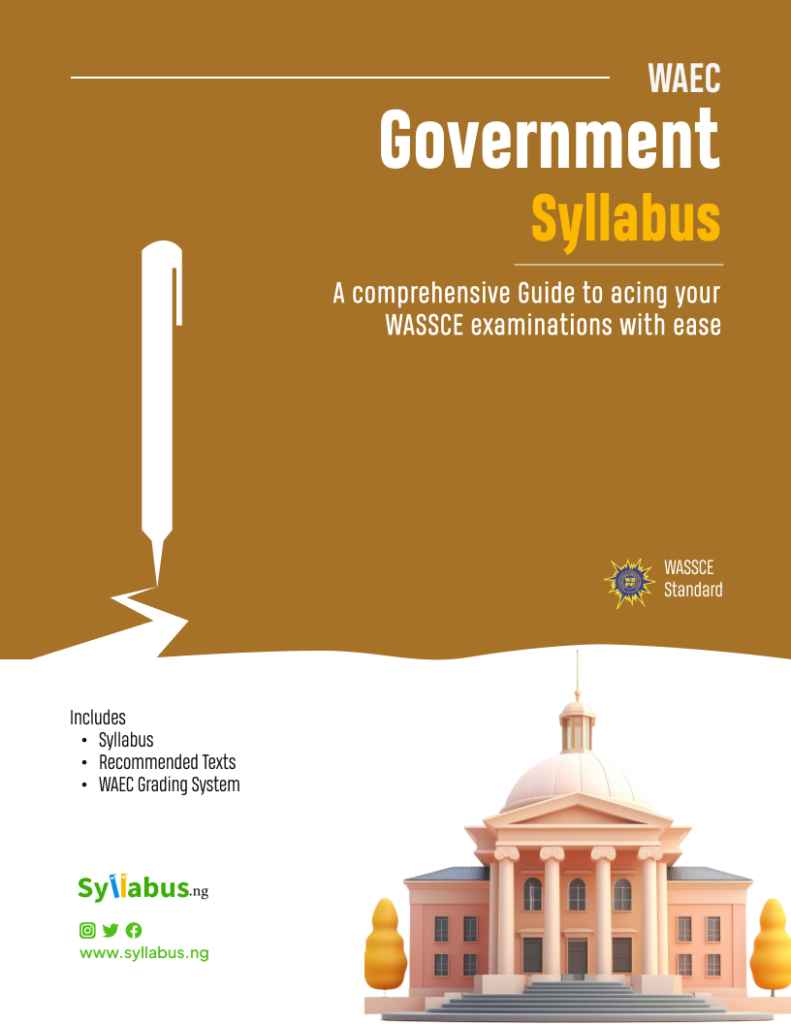Get straight A’s when you download and study with this Government Syllabus for WAEC.

Home » WAEC Syllabus » WAEC Government Syllabus
The West African Examination Council (WAEC) syllabus for Government is a compilation of the important topics that your exam questions will cover.
Anyone writing Government in the upcoming WAEC exams should read this article to the very end because you not only get to see the list of topics WAEC will set questions from, but you will also see a list of textbooks that will help you understand these topics better and answers to some questions you may have about the exam.
There will be two papers – Paper 1 and Paper 2.. Papers 1 and 2 will be written in one sitting.
PAPER 1: This will consist of fifty multiple-choice objective questions drawn from the entire syllabus. Candidates will be required to answer all the questions in 1 hour for 40 marks.
PAPER 2: This will be a 2-hour essay-type test consisting of Sections A and B
Section A: Elements of Government Shall contain five questions out of which candidates shall be required to attempt any two.
Section B: Political and Constitutional Developments in West Africa and International Relations Shall have sets of five questions each; one set for one member country.
Each candidate is to answer two questions chosen from the set in the country in which he/she is taking the examination. The paper shall carry 60 marks.

Excelling your WAEC Government exam starts from knowing what’s expected of you.
Don’t be left behind. Download the Syllabus today.
| WAEC SYLLABUS FOR GOVERNMENT | ||
| SN | TOPICS | OBJECTIVES |
| THEME | ||
| 1 | MEANING AND SCOPE OF THE SUBJECT MATTER – GOVERNMENT | (i) Government as an institution of the state . Definition of state, features, structure and functions. (ii) Government as a process or art or governing. (iii) Government as an academic field of study – reasons for studying government. |
| 2 | BASIC CONCEPTS AND PRINCIPLES OF GOVERNMENT | (i) Basic concepts – State, *Society, *Nation, Power, Authority, Legitimacy, Sovereignty, Democracy, Political Culture and Socialization, Communalism, Feudalism and oligarchy, *Liberalism, Socialism, Communism, Capitalism, Fascism, Aristocracy, Totalitarianism. Meaning and features. (ii) Basic principles – Rule of Law, Fundamental Human Rights, Separation of Powers/Checks and Balances, Constitutionalism, Political participation, Representative Government, Centralization and Decentralization – (Delegated Legislation, Devolution and Decentralization). |
| 3 | CONSTITUTIONS | (i) Definition and Sources (ii) Functions (iii) Types and Features , (Written and Unwritten, Rigid and Flexible). |
| 4 | ORGANS OF GOVERNMENT | The Executive, the Legislature and the Judiciary – Judicial Independence. (Types, Structure, Composition/membership; Functions; powers and limitations). |
| 5 | STATE STRUCTURE AND CHARACTERISTICS OF GOVERNMENT | (a) Types – Unitary, Federal, Confederal, Presidential or Non-parliamentary, Parliamentary or Cabinet, Monarchical and Republican. Meaning, types, features, merits and demerits. |
| 6 | CITIZENSHIP | Meaning, mode of acquisition, rights, duties and obligations of individuals in the state. Means of safeguarding rights of citizens. |
| 7 | POLITICAL PARTIES AND PARTY SYSTEMS | (i) Political Parties – definition, organization/structure, and functions. (ii) Party Systems – definition, types, merits and demerits. |
| 8 | PRESSURE GROUPS, PUBLIC OPINION AND MASS MEDIA | (i) Pressure Groups – definition, types, mode of operation and functions; (ii) Public opinion – definition, formation, Measurement and importance; (iii) Mass Media – definition, roles and impact. |
| 9 | THE ELECTORAL SYSTEMS, PROCESSES AND ELECTORAL MANAGEMENT BODY | (a) Electoral Systems and Processes (i) Election- Meaning and purpose of elections. (ii) Franchise – meaning, and limitations. (iii) Types, advantages and disadvantages of Electoral Systems. (b) Electoral Management Body – definition, functions, problems/constrains. |
| 10 | PUBLIC/CIVIL SERVICE ADMINISTRATION | (i) Public/Civil Service – Meaning, Structure, Characteristics and Functions. (ii) Public/Civil Service Commission –meaning and Functions. (iii) Public Corporations – definition, purposes, functions, control, challenges, need for commercialization and privatization. (iv) Local Governments – Meaning, structure, Purposes, Functions, Sources of revenue, control and problems. |
| 11 | PRE-COLONIAL POLITICAL SYSTEM OF CANDIDATES’ RESPECTIVE COUNTRIES | The Structural Organization of the following: (a) Nigeria – Hausa/Fulani, the Yoruba and the Igbo. (b) Ghana – The Akan and the Talensi. (c) Sierra Leone – The Mende and Temme. (d) The Gambia – The Wolof, Mandingo and Jola. (e) Liberia – The Vai and the Kru. |
| 12 | COLONIAL ADMINISTRATION | (i) The Policy and Structure of the British Colonial Administration – Crown Colony, Protectorate and Indirect Rule. (ii) The Policy of French Colonial Administration – Assimilation and Association (Loi Cadre). (iii) Impact, Advantages and disadvantages of Colonial Rule. |
| 13 | NATIONALISM IN CANDIDATES’ RESPECTIVE COUNTRIES | (i) Nationalism: Meaning, factors and effects. (ii) Key Nationalist leaders/movements and their contributions. |
| 14 | CONSTITUTIONAL DEVELOPMENTS IN CANDIDATES’ RESPECTIVE COUNTRIES | (i) Pre-Independence Constitutions – (a) Nigeria (features) – Clifford 1922 Richards 1946 Macpherson 1951 Lyttleton 1954 (b) Ghana (features, merits and demerits) – Clifford 1916 Guggisberg 1925 Burns 1946 Arden Clarke 1951 Nkrumah 1954 (c) Sierra Leone (features, merits and demerits) – Slatter 1924 Stevenson 1947 Beresford Stooke 1951 The 1956 and 1958 Constitutions. (d) The Gambia (features, merits and demerits) – The 1947, 1951, 1954, 1960, 1962 and 1963 Constitutions. (ii) Post-Independence Constitutions – Features (a) Nigeria – Independence Constitution, 1960 Republican Constitution 1963 The 1979 and 1989 Constitutions 1999 Constitution – Origin, features, strengths and Weaknesses. (b) Ghana – Independence Constitution, 1957 Republican Constitution 1960 2 nd Republican Constitution 1969 3 rd Republican Constitution 1979 4 th Republican Constitutions 1992. (c) Sierra Leone – Independence Constitution 1961 Republican Constitution 1971 The 1978 and 1991 Constitutions, (d) The Gambia – Independence Constitution 1965 Republican Constitution 1970. 2 nd Republican Constitution 1997 (e) Liberia – Independence/Republican Constitution 1947 2 nd Republican Constitution 1985 |
| 15 | DEVELOPMENT OF MAJOR POLITICAL PARTIES IN THE CANDIDATES’ RESPECTIVE COUNTRIES | – Nigeria – Sierra Leone – The Gambia – Liberia Formation, Objectives, Sources of Finance, Achievements and Failures |
| 16 | MILITARY RULE IN THE CANDIDATES’ RESPECTIVE COUNTRIES. | – Nigeria – Ghana; – Sierra Leone – The Gambia – Liberia Causes, effects and various military regimes. |
| 17 | FEDERAL/UNITARY SYSTEMS OF GOVERNMENT IN WEST AFRICA | – Nigeria – Sierra Leone – The Gambia – Liberia Origin, Factors, Structure, Features and Problems |
| 18 | FOREIGN POLICIES OF THE CANDIDATES’ RESPECTIVE COUNTRIES | – Nigeria – Ghana – Sierra Leone – The Gambia – Liberia Definitions, Factors, objectives, advantages and disadvantages. |
| 19 | INTERNATIONAL ORGANIZATIONS | The United Nations Organizations (UNO), The Commonwealth of Nations, African Union (AU) – NEPAD, The Economic Community of West African States (ECOWAS). Origin, aims/objectives, achievements and problems. |
There are two papers in the WAEC Government exam. Paper 1 which is the objective section will last for 1hr 40mins and paper 2 which is the theory section will last 2 hours.
Stay calm and pay attention to the instructions. Do not panic whenever you see a question you don’t know. When you get confused about a question, raise your hand and ask the invigilator for clarification.
Draw up a reading timetable for all the subjects you will be taking in the WAEC exams.
The minimum score which will give you a C6 grade is 50%. Anything less than 50% and you have a D which could affect your chances of getting admission to the university.
You should be able to understand each topic so well that you can apply them to your daily life.
Practice, practice, practice. Study the syllabus, recommended textbooks, notes, andpast questions together. You can also ask your teacher or tutor questions on topics you don’t understand
All the topics in the syllabus above are important and you will be tested on them.

Excelling your WAEC Government exam starts from knowing what’s expected of you.
Don’t be left behind. Download the Syllabus today.